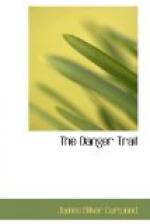She nodded again and again, delighted that he understood her. There was something so childishly sweet in her face, in the gladness of her eyes, that Howland stretched out both his hands to her, laughing aloud. “You!” he exclaimed. “You—camping out here!” With a quick little movement she came to him, still laughing with her eyes and lips, and for an instant he held both her hands tight in his own. Her lovely face was dangerously near to him. He felt the touch of her breath on his face, for an instant caught the sweet scent of her hair. Never had he seen eyes like those that glowed up at him softly, filled with the gentle starlight; never in his life had he dreamed of a face like this, so near to him that it sent the blood leaping through his veins in strange excitement. He held the hands tighter, and the movement drew the girl closer to him, until for no more than a breath he felt her against his breast. In that moment he forgot all sense of time and place; forgot his old self—Jack Howland—practical, unromantic, master-builder of railroads; forgot everything but this presence of the girl, the warm pressure against his breast, the lure of the great brown eyes that had come so unexpectedly into his life. In another moment he had recovered himself. He drew a step back, freeing the girl’s hands.
“I beg your pardon,” he said softly. His cheeks burned hotly at what he had done, and turning squarely about he strode up the trail. He had not taken a dozen paces, when far ahead of him he saw the red glow of a fire. Then a hand caught his arm, clutching at it almost fiercely, and he turned to meet the girl’s face, white now with a strange terror.
“What is it?” he cried. “Tell me—”
He caught her hands again, startled by the look in her eyes. Quickly she pulled herself away. A dozen feet behind her, in the thick shadows of the forest trees, something took shape and movement. In a flash Howland saw a huge form leap from the gloom and caught the gleam of an uplifted knife. There was no time for him to leap aside, no time for him to reach for the revolver which he carried in his pocket. In such a crisis one’s actions are involuntary, machine-like, as if life, hovering by a thread, preserves itself in its own manner and without thought or reasoning on the part of the creature it animates.
For an instant Howland neither thought nor reasoned. Had he done so he would probably have met his mysterious assailant, pitting his naked fists against the knife. But the very mainspring of his existence—which is self-preservation—called on him to do otherwise. Before the startled cry on his lips found utterance he flung himself face downward in the snow. The move saved him, and as the other stumbled over his body, pitching headlong into the trail, he snatched forth his revolver. Before he could fire there came a roar like that of a beast from behind him and a terrific blow fell on his head. Under




